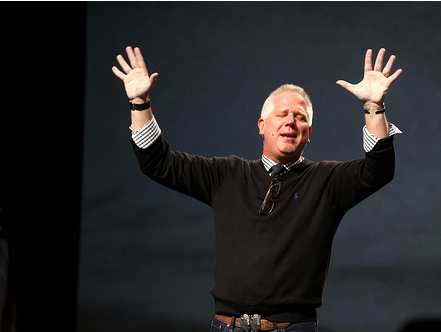
<a href="http://www.flickr.com/photos/whitehouse/8555063338/in/photostream">Pete Souza</a>/Flickr
Last week, conservative talk show host and media mogul Glenn Beck decided to let his listeners in on what he dubbed “the biggest story in American history.” It’s called System X. “If you don’t stop it,” he warned, “American history is over as you know it.”
As Beck explained it, a little-known Department of Education program, supported by rich philanthropists, business interests, and the United Nations, was turning public schools into the world’s next great data-mining frontier. Using carrots offered up in the 2009 stimulus bill, the federal government and its contractors could compile hundreds of points of data on your kids and use it for who knows what. The result: “System X: a government run by a single party in control of labor, media, education, and banking; joined by big business to further their mutual collective goals.”
The gateway to this dystopian future, which Beck predicted would lead to some portions of the United States embracing Nazism, was President Barack Obama’s controversial push for a new national curriculum known as Common Core. The conspirators are far-ranging. Rupert Murdoch is in on it. So is the American Legislative Exchange Council, Bill and Melinda Gates, and Jeb Bush.
Beck’s not the only person fighting Common Core. Lawmakers in 18 states have considered legislation to block the implementation of the curriculum standards. Five—Alaska, Minnesota, Nebraska, Texas, and Virginia—have successfully rejected or partially rejected Common Core. Virginia Gov. Bob McDonnell reiterated his opposition to Common Core in late March, just one week after Texas Gov. Rick Perry went on Beck’s program to denounce it.
On the most basic level, the fight over Common Core is same fight parents and policymakers have been waging over public education for the last century, centering on two basic questions: What is the appropriate level of federal involvement in local schooling? And if we did settle on an umbrella curriculum, what should it actually look like? Education reformer Diane Ravitch, for one, opposes Common Core on the grounds that, while there should be a set of national education tenets, she believes “such standards should be voluntary, not imposed by the federal government.”
But in the hands of activists like Beck, Common Core has taken on a more ominous tone. The long-standing fever swamp fears of enforced secularism and multiculturalism, like those promoted by now-Rep. Michele Bachmann (R-Minn.) in the 1990s, have been given a digital makeover.
The core itself is what it sounds like—a broad curriculum standard. States that choose to accept Common Core gain access to a pot of billions of federal dollars. Social conservatives have never liked that kind of incentive game, especially when it’s connected to a Democratic president. (GOP Rep. Rob Bishop, whose Utah district is ground zero for the anti-Common Core movement, called the Common Core a “hook” from which the state could never extricate itself.)
According to its critics, the most nefarious consequence of Common Core is a data collection program that’s part of the American Recovery and Reinvestment Act (the stimulus). The idea is to better track student demographic and achievement data to figure out what’s working and what’s not, and respond accordingly. Some of the biggest names in American politics and business support the idea. In 2011, the Bill and Melinda Gates Foundation teamed up with the Carnegie Foundation and an educational subsidiary of Rupert Murdoch’s News Corp. to develop a database of student data that states can access for free until 2015. (After that it will charge an annual fee.) At a speech at the White House last November, Shawn T. Bay, CEO of the education data company eScholar, called Common Core “the glue that actually ties everything together” in the Department of Education’s Big Data push.
A writer at the anti-core site Truth in Education synthesized the movement’s fears thusly:
There will be a massive data tracking system on each child with over 400 points of information collected. This information can be shared among organizations and companies and parents don’t have to be informed about what data is being collecting. They will collect information such as: your child’s academic records, health care history, disciplinary record, family income range, family voting status, and religious affiliation, to name a few. Big brother will be watching your child from preschool till college (P20 Longitudinal Data System). You, the parent, are UNABLE to opt your child out of this tracking system.
According to anti-Common Core activists, the government won’t only collect student data from test scores and paperwork—they’ll also use actual lab experiments. Beck cited a February draft report released by the Department of Education on the future of learning technology. Among other things, the report highlighted studies that had used tools such as a “wireless skin conductance sensor,” “functional magnetic resonance imaging,” and a “posture analysis seat” to measure how students learn. As Beck put it, “This is like some really spooky, sci-fi, Gattaca kind of thing.” But the Department of Education draft report didn’t actually recommend that these tools be incorporated into the classroom.
Critics also take issue with what’s in the standards—particularly the math portion. Writing about the math standards in The Atlantic last November, retired educator Barry Garelick feared that kids would become “‘little mathematicians’ who don’t know how to do actual math.”
But as Kathleen Porter-Magee and Sol Stern point out at the conservative National Review Online, much of the criticism about the contents of Common Core has been based on misinformation, if not “deliberate misunderstanding.” Although conservative critics like Michelle Malkin allege that Common Core brushes aside classics such as To Kill a Mockingbird, it in fact holds up Harper Lee’s novel as an “examplar” of what students should be taught.
For now, most GOP lawmakers’ concerns about the Common Core focus on the curriculum and the idea of federal control, not Big Data. But the Obama administration is wary of Common Core taking on a life of its own in the conservative fever swamps. Last February, when South Carolina Republican Gov. Nikki Haley suggested she might block the implementation of Common Core in her state, Secretary of Education Arne Duncan released a statement punching back.
Citing the endorsements of Republican governors like Mitch Daniels of Indiana, Bill Haslam of Tennessee, and Chris Christie of New Jersey, Duncan dismissed Haley’s concerns as little more than tinfoil-hat trolling: “The idea that the Common Core standards are nationally-imposed is a conspiracy theory in search of a conspiracy.”
Then again, when has that ever stopped Glenn Beck?



















